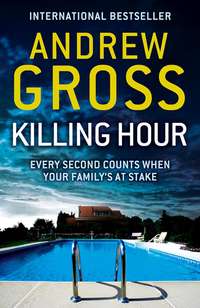
Полная версия
Reckless
He nodded. He bit his lower lip and punched in 911 on the Bluetooth. A female duty officer answered on the second ring.
“Greenwich Emergency.”
“This is Kevin Mitman. I live at 2019 John Street,” he said, meeting his wife’s eyes. “We just came back from a hockey game. I’m outside in the car.” He took a breath and grabbed his wife’s hand. “I think someone’s broken into our house.”
Chapter Sixteen
It wasn’t them.
The two stunned burglars, clad in athletic sweatshirts and jeans, were descended upon by the Greenwich police—lights flashing and guns drawn—carrying a plasma TV up the Mitmans’ driveway, heading back to their van.
The two robbers were barely adults. Yemeni kids from Norwalk. One was twenty-two, the other nineteen. They were shaking in their boots. An hour’s interrogation back at the station had them giving up who they had felt up in the fifth grade. They owned up to several of the break-ins. The McLains. The Polashes. The St. Angelos. They gave up the whereabouts of a basement apartment where they still could find much of the stolen cache.
It wasn’t them.
They got their prospective locations through another cousin who delivered the local paper each morning. That’s how they knew when homeowners planned to be away. Neither of them had much of a record. The older one had been pinched for shoplifting. The nineteen-year-old was actually enrolled in Norwalk Community college and this was his first arrest. The older one had a gun on him, an old, passed-down Beretta .22 that he’d bought on the streets. More for show than any real effect.
No match for the Heckler and Koch nine-millimeter that had been used on the Glassman family.
When they were confronted with the murders, everything started coming out of them. They even had an alibi for that night. The younger one’s cousin was having a betrothal celebration in Passaic, New Jersey. He had spent the night at the cousin’s house.
The older one had spent the night at a bar in White Plains. Until two A.M. Closing time.
They were stupid and out of their league, and it was good to finally shut their little operation down.
It just wasn’t them, Hauck knew. It wasn’t the two who murdered Marc and April Glassman.
That morning, he caught Chrisafoulis on the phone as he was scrambling between news briefings. “You got one minute,” the head of detectives snapped. “You see what’s happening out there, don’t you?”
Hauck said, “Yeah, I see it.”
What he was talking about were the ten news vans that were backed up like cattle cars onto Mason Street outside the station. CNN, Fox, the local Connecticut stations. Reporters surrounding anyone who came out who looked like they might have some connection to the case. The Glassman murders were page-one news—the grisly scene, the rich suburban family murdered in their secluded home, the calm of Greenwich shattered. And it had brought down a Wall Street icon too.
“It wasn’t them, was it?” Hauck pressed. He doubted the motive was robbery from the start.
“Ty, you know I can’t keep doing this. I only have so much room.”
“Steve…” His voice was insistent. “Were they the ones who did the job?”
“They admitted to several jobs,” the detective said evasively. “The two out on North Ridge and Willow. They told us where some of the loot was stashed. How they staked out the homes…”
“You said that one of the Glassman perps had long reddish hair. You said he had some kind of tattoo on his neck.” Hauck knew he was going farther than he should. “You said they wore work uniforms. You found tire tread marks on the street. The gun that killed the Glassmans was an H and K nine-millimeter. C’mon, Steve, you know damn well what job I’m talking about.”
He waited a beat before Chrisafoulis replied. And when he did, it was short and under his breath. “No. They copped to the other break-ins. But not the Glassmans. One of them is nineteen, the other twenty-two. The guns didn’t match up, or the tire tread. Or the descriptions. You should’ve seen them; shit came out of their pants—”
“Are you buying?”
“They said they set up the jobs through a friend who handled the local paper route. That’s how they knew who was away. The Glassmans—they didn’t even get the Greenwich Time. These guys also had solid alibis for the night of March sixth. We’re getting confirmation, but there was a gas receipt in the car that already put one of them on the Jersey Turnpike around that time…
“Yeah, I’m buying,” Chrisafoulis sighed resignedly.
Hauck let out a grunt of disappointment. But not surprise. He never thought this fit the pattern of a burglary. It may just have all been a diversion. The safe left open, the drawers rifled through. It may have all been to mask what they were really there for.
Who would have wanted Marc Glassman dead?
“You know where this is leading, don’t you, Steve?”
“You’re driving around a BMW now, Ty. You don’t have business of your own to spend your time on?”
“Glassman sank the firm. I don’t know who would’ve had anything to gain, but I know what the result of all this is, and it’s sitting there on the front page of the Wall Street Journal today.”
The detective paused. Maybe he was thinking it over. “You never used to read the Journal, Ty. You never made it past the sports.”
“I guess things change.”
“No, they don’t,” the detective said. Hauck wasn’t sure what he was talking about. But he didn’t think it was the paper. “They don’t.”
They hung up. Hauck stared at the bold headline of the Wall Street Journal on his desk: FED WEIGHING BAILOUT ON WERTHEIMER; HUNDRED-YEAR-OLD FIRM COULD LEARN FATE TODAY.
Marc’s still at Wertheimer. Doing great, April had said.
He balled his fists and dropped them against his desk in frustration. Who had something to gain?
His line rang again and Hauck waited before picking up, lost in that question. When he did, on the fourth loud ring, the caller surprised him.
“Mr. Hauck, it’s Merrill Simons.”
“Ms. Simons…” Hauck hadn’t contacted her yet with what he knew. He didn’t want to cause her any real hurt until he had put it all together. “So far I haven’t heard back on much yet. What can I do for you?”
“The last time we spoke…,” she said, hesitating. Then she cleared her throat. “I have those other things on Dani you asked me for.”
Chapter Seventeen
Roger Cantwell stared out at the dark Manhattan sky. The illuminated spire of the Chrysler building shone brightly a few blocks south. It had been a week since the initial disclosures on Marc Glassman. A week of hell. Sleeves rolled up, tie loosened, Cantwell had poured himself a tall Springbank single-malt, his favorite. It had been poured many a time to toast a successful deal or an acquisition.
He couldn’t believe it had come to this.
Wertheimer Grant was one of the most respected names on Wall Street. It had weathered twenty financial downturns. Led the recoveries on the way back up. The firm’s commercials—“Your future is our future”—were broadcast during the Super Bowl. Just a year ago they had a market cap of a hundred billion.
How could no one be coming to their rescue? How could there be no fix?
It was insane.
He had made a final pitch to Tom Keating at Treasury. Christ, they had known each other for thirty years, used to get hammered together to celebrate their deals. Both of them had started as bond salesmen. Wertheimer was far too important to ever fail. Yes, Cantwell realized, life would clearly change for him. The cushy bonuses were gone. And the plane. His legacy would forever be scarred by the company’s having to accept public money. He didn’t look forward to how it would play—in the papers or at his golf club. He wasn’t a hundred percent sure if he’d be able to even stay on.
Still, they had to keep themselves in business.
They were Wertheimer Grant, for God’s sake.
He threw back another hard swig. The Scotch, smooth as it was, burned, and that felt good on the way down. Frigging Glassman…That little prick had brought down the whole firm. Whatever their fate, the market was going to tank six hundred points tomorrow!
No, Cantwell thought, gazing out at the city he was once such a commanding force in; if he was honest, the bastard had only been the last indefensible boot that had pushed them over the edge. It had been years of the belief that nothing could stop them. More arrogance than greed. The end came so suddenly it hit them like a truck. No one had seen it coming. Not the risk managers, not the rating agencies, not the press. A giant with muscles, as someone had described it once, stuffing itself with cake.
That’s what they were. Accountable to no one.
Well, now the giant was about to take a mighty fall.
Cantwell rolled the Scotch around his tongue, his mind drifting to a time years before when he was just starting out, wet behind the ears. They had this bond issue from Texas from a basically bankrupt town no one could sell. He was twenty-six, thrust into a job he had no training for, with a boss, Charlie McAfee, a real bastard, Cantwell recalled, who was happy to throw him to the wolves.
“Sink or swim up here,” the fat fuck said, grinning, puffing on a cigar. “You know how to swim, Roger?”
Asshole didn’t know who he was dealing with. Roger Cantwell chuckled.
He swam. With the goddamn dolphins, he swam! He sold it. He got it done. Every last share. Damn thing ended up oversubscribed. He took it across the country, to pension funds and small brokerage houses. He wrapped the purchase into a twofer with solid triple-A’s. Three hundred and fifty million dollars. That night, he had a feeling of self-importance he would never forget. He’d puffed on his first Cuban cigar. Screwed a hot waitress at Doubles like he was some kind of porno star.
Six months later he had the old fart’s job.
Cantwell drained the last of his drink. Funny, he thought now, two years later the bond defaulted. They all knew it would. Blamed it all on Charlie.
It had made his damn career.
There was a knock at his door. Cantwell turned. Ronald Wu, his CFO, with Brenda Pearlstein. They’d just been finishing up with Treasury and had come to give him the painful news.
“Come on in,” Cantwell called, resigned. He came away from the window and sat on the long walnut conference table. “So what are the terms?” he inquired. “Just how much flesh do those vultures want us to give up?”
Wu was a brilliant financial mind and over the years had negotiated many tough acquisitions. But this time he was somber.
“Terms? There are no terms, Roger. They passed.” He came up and collapsed in a chair at the end of the conference table. “No more discussions. I’ve alerted the attorneys. We’re done.”
Chapter Eighteen
The Wall Street Journal
Once-Mighty Wertheimer Collapses as Treasury Department Declines Bailout; Wall Street Stunned
Once one of Wall Street’s most historic companies, Wertheimer Grant was forced to shut its doors as last-minute options for the troubled firm, including a prospective bailout by the United States Treasury, failed in the wake of the damage done by a rogue equities trader recently murdered in his Greenwich home. The beleaguered firm was also the victim of a balance sheet weighted down by questionable mortgage-backed assets.
Wertheimer, whose shares last summer traded at over a hundred dollars, sold off in heavy after-hours trading last night for under fifty cents a share.
The once-defiant CEO, Roger Cantwell, who is said to have spent the night in constant talks with potential partners from around the globe, was unavailable for comment. Ronald Wu, Wertheimer’s CFO, released a short statement saying the firm “is committed to protecting the interests of its loyal account holders and investor base and right now is studying all available options, including selling off its assets.”
Employees of the hundred-year-old firm came to its forty-eight-story glass headquarters on New York’s Park Avenue in shock, let in to collect their personal belongings by security personnel. Secretaries and analysts huddled on the street in disbelief.
“The ship sank,” one veteran hedge fund manager said. “Since the news of that trader, there’s been a weeklong run on the accounts. They no longer had the reserves to fight it off.”
The firm succumbed to a balance sheet eroded by heavy investments in toxic subprime mortgages and hurt further by the recent admission that one of their most highly regarded traders had lost as much as twelve billion dollars through unauthorized activity. These latest losses only came to light in the wake of the Glassman family shooting deaths, thought to be a robbery at his spacious Greenwich, CT, home, but now questions have arisen as to whether it was indeed part of a recent home break-in spree there.
“They were too big, too brash,” one Wall Street insider said. “They didn’t see the oncoming train. How fitting that it was being driven by their own star.”
For the fifth straight day, the stock market was expected to tumble to new lows, dragging the financial sector farther down. Shocking revelations of losses and malfeasance have become part of daily life on Wall Street, and the biggest concern, given the loss of reserves and the increasingly questionable value of all mortgage-related securities, is no longer whether Wertheimer Grant will survive, but which “unsinkable” Wall Street icon will be next.
Chapter Nineteen
In her cluttered, windowless office, in the basement of a drab gray building a block from the Treasury Department in Washington, DC, Naomi Blum was trying to put it all together too.
Everyone was buzzing about it. Wertheimer Grant going under. Years of believing they were the right hand of God had dragged them to the edge. Not to mention huge bets on the subprime mess and leveraging up thirty to one.
All it took was a single rogue money manager to push them over.
But what was adding to the trouble was the new news feed on her computer: MURDERED TRADER NOT LINKED TO LOCAL BREAK-INS.
Not linked…
Naomi sucked on a kiwi-mango smoothie, her lunch.
On her desk was a slim blue folder labeled SECRET AND CONFIDENTIAL. She had been copied on it by a liaison over at the FBI. The file contained a series of transcripts picked up from the cell phone of a wealthy Bahraini businessman long suspected of being a financial go-between with people in the region who might want to do the U.S. harm. Probably why the transcript had landed on her desk in the first place. She put on her glasses and browsed through the last, cryptic entry, dated February 8.
What did it mean?
As the lead investigator for the newly formed Financial Crime and Terrorism Task Force, a unit of eight under the Department of the Treasury, her job was to identify and interrupt wide-scale financial fraud and conspiracies that might have national-security or market-impact implications.
They were the first responders, so to speak, in potential economic attacks against the United States. They followed money around the world, charted patterns of deposits in nonconforming banks, monitored the real work of certain questionable “charities,” and pretty much “chalkboarded” various potential security threats to the financial landscape here.
It all sounded very important—at least that’s what Naomi’s mother always told her.
Still, Treasury wasn’t exactly the glamour posting these days.
In her two years on the job, they had laid open giant health care schemes aimed at bilking hundreds of millions of subscribers with underpaid claims. They’d prosecuted two prominent hedge fund principals who had diverted billions in duped investors’ assets—one who was apprehended trying to fake his own death in an attempt to flee the country, the other presently serving a twenty-year RICO charge at the federal correctional facility in Jesup, Georgia.
Of course, by the time it all got to an arrest Treasury was no longer running the show. It would be turned over to the financial terrorism section of the FBI. Or the AG’s office.
Still, Naomi didn’t mind. She sort of liked being the behind-the-scenes investigator. Like CSI. The real CSI, not the TV glamour guys who took the bad guys down and, guns out, were first through the door.
Not that she couldn’t handle herself in that way if she had to.
Naomi was five foot three, fit as any field agent, wore stylish black glasses, and kept her dark hair short, Mika Brzezinski–style. She had what guys might call a sort of “bookish” look, like a library rat, despite, behind her frames, her brilliant gray eyes.
She hadn’t set out to be in this role. She had actually started out studying music theory at Princeton. Under Amos Kershorn. Her big claim to fame was being first cello in the Anne Arundel County High School Orchestra outside of Baltimore. Along with being an all-Ivy striker on the women’s field hockey team.
After 9/11, her twin brother, Jeremy, a lacrosse player at UVA, had dropped out and enlisted. All he said was it was something he just had to do. Growing up, the two of them couldn’t have been less alike and still come from the same womb. Jeremy was six foot two, wide shouldered, charismatic, solid as a rock. Cocky as all hell. Only started cracking the books the night before a test.
She was a foot shorter, quiet, to this day actually kept her driver’s license hidden behind her library card. She’d gotten the brains, they always joked, and Jer got whatever was leftover. After a tour in Iraq, he was sent to Fort Benning in Georgia as part of airborne ranger training, but in his second week there, the copter he was flying in crashed. He survived but lost both his legs. When she went to see him in the hospital—this big, brave, brawny guy, first-team all-ACC—he turned away. Empty. A shell of what he once was. Even a blind person could have seen the disappointment written onto his face.
Two days later, she left Princeton and signed up herself.
She had never really been into the military or overly patriotic before. Her dad was a newspaper editor in Baltimore. She just felt inside that it was something she had to do. In the steps of her big brother. She even pushed for Jer’s old regiment, but the army took a look at the fancy school she’d come from and those impressive test results and placed her into an intelligence unit. Naomi spent two years in Iraq as a junior member on the army’s internal investigative team. One of her assignments was to look into the bloodbath that occurred at Nisoor Square in Baghdad, where a handful of private security guards, claiming they were provoked, fired wildly into a crowded square, leaving seventeen Iraqis dead. Naomi pushed hard in her search, sure that an unprovoked and criminal act had been committed. She urged her superiors to detain the participants, but by that time the agency had secretly whisked the guilty contractors “out of country,” and the government seemed intent on papering everything over and letting them go.
Years later, it still burned her.
Naomi realized that the accountability went much higher, but by that point the result was merely a whitewash, a PR exercise, though in the wake of press exposure from her findings, the security outfit was forever banned from Iraq.
After her second tour—she saw action on a couple of hairy convoys—she opted out and went back to school. Changed her major to economics. A degree in music no longer carried the same weight in her new way of thinking of the world. She figured she’d go to law school, maybe Wall Street, do the sixteen-hour-days-until-you-make-partner thing, but when she was recommended to Treasury by a superior she had worked with in the field, and he told the department they would never find anyone smarter or more dogged on a case, something just clicked.
What clicked was the chance to finally feel she was making a difference.
She’d always been on the small side physically, and private. Part of her had always needed to prove that she was tough enough. It went back to the way she played attack on the field—hide on the flank, spot the opening, worm her way in among the bigger girls. Use her speed and guile and knowledge of the game.
Then hammer it home.
It was what she was still doing. At Treasury. She just happened to be the only one doing it with the five-note opening progression of Glass’s “Music in the Shape of a Square” tattooed on her butt.
Naomi looked again at the FBI security transcript. She sipped her smoothie. She didn’t know the caller, but she damn well knew the person he was caught speaking to.
And it wasn’t making a whole lot of sense.
The conversation had taken place about a month ago. Since then the world financial markets had fallen apart. The Dow was down 20 percent. One of the largest institutions brought down by a rogue trader.
And here was one of the most influential financial managers in the world, who oversaw one of the largest pools of investment capital anywhere, in contact with a suspected terrorist money mover.
And the cryptic words uttered in Arabic that had been passed along to her. That scared her. That left her wondering what this was all about.
The planes are in the air.
Chapter Twenty
Monday afternoon, Hauck sat in his car across the street from the Lake Avenue Lower School in Greenwich.
Three weeks had passed since the Glassman murders. Still no link to their killers had been found.
At a little after two forty in the afternoon, a stream of kids began to emerge from the gray concrete building. Moms, in capri pants and yoga outfits, chatting with other moms or on their cells, pulling up their SUVs. Some of the kids carted stuff from school, brightly colored presentation boards or artwork, knapsacks slung over their shoulders. Others carried baseball gloves or lacrosse sticks, shouting excitedly about the Rangers’ playoff game tonight or American Idol. The cars pulled up; the kids climbed in; the moms waved goodbye to each other and drove away.
The entrance quieted down.
A couple of minutes later, Hauck saw the small, sandyhaired boy in jeans and a Derek Jeter jersey come out, holding on to the hand of an older man. His grand father. He carried a piece of paper all rolled up, a red knapsack slung over on his back.
Hauck remembered him as he saw him three or four years ago. In April’s car.
Evan.
It was his first day back at school after the incident. The local papers had picked it up. A couple of school officials came out and watched as he and his granddad made their way to the parking lot, making sure there were no reporters badgering them.
Конец ознакомительного фрагмента.
Текст предоставлен ООО «ЛитРес».
Прочитайте эту книгу целиком, купив полную легальную версию на ЛитРес.
Безопасно оплатить книгу можно банковской картой Visa, MasterCard, Maestro, со счета мобильного телефона, с платежного терминала, в салоне МТС или Связной, через PayPal, WebMoney, Яндекс.Деньги, QIWI Кошелек, бонусными картами или другим удобным Вам способом.







